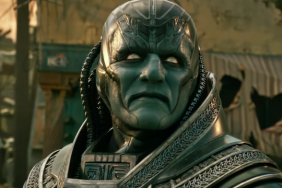The latest Dark Phoenix trailer gave us a lot of new story details about Fox’s swan song with the X-Men. However, the biggest surprise came during the first 30 seconds when Jean Grey used her telekinetic abilities to obliterate Mystique. When it comes to a trailers, withholding major plot points until opening day is typically considered Marketing 101. But while speaking with Entertainment Weekly, writer and director Simon Kinberg explained the studio’s decision to break that rule.
“Well, the thought process behind that was to primarily show that this is a movie that is unlike other X-Men movies,” said Kinberg. “It’s a movie where shocking things happen, where intense, dramatic things happen. People don’t just fall off buildings and dust themselves off and walk away. There’s a reality to this movie and a consequence to this movie. Even more than that, it was to show that Jean/Dark Phoenix is genuinely a threat to everyone, including the X-Men.”
RELATED: The New Dark Phoenix Trailer is Finally Here to Eviscerate Worlds
It’s possible that Mystique’s death isn’t permanent, especially if Dark Phoenix is still a prequel to the original X-Men trilogy. Nevertheless, it couldn’t have been easy to kill off one of the franchise’s biggest stars in Jennifer Lawrence. “I had a lot of emotions about it,” Kinberg continued. “I was obviously sad about it, as Jen’s friend, and also as a fan of Jen as an actress. But I felt it was the strongest, most dramatic thing for the movie, and sometimes you have to make those kinds of hard decisions to service the larger story. And the larger story really is Jean cracking up, losing control because she’s more powerful than anyone else in the world. To dramatize that properly, you have to show real loss, you have to show real pain and show real threat and menace.”
Kinberg also described how Jean’s sudden loss of control will split the X-Men into two factions. “Mystique’s death is the thing that fractures the family of the X-Men, including Magneto [Michael Fassbender], and sets people who were friends on opposite sides, and people who were enemies become allies. For me, if there’s a metaphor for the film, it’s like if someone in your life or your family starts to lose control, whether that be because of drugs or mental health issues or more minor things, the question is: At one point do you give up on them? And how long do you hold out hope for them?”
As for whether any other characters will meet their ends in the film, Kinberg insists that there will be “other casualties.” But naturally, he isn’t saying who.
You can share your thoughts on Kinberg’s remarks in the comment section below!




